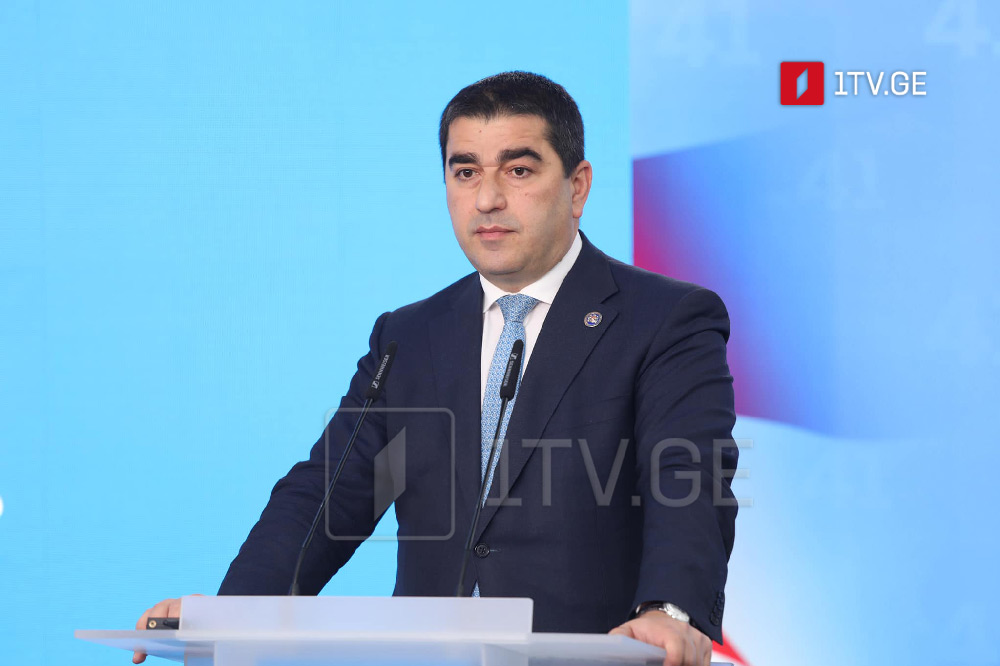
The Chairman of the Georgian Parliament, Shalva Papuashvili, has announced that he declined to meet with a group of parliamentarians from several countries, led by Lithuanian Parliament member Žygimantas Pavilionis, visiting Georgia these days.
Papuashvili has published the letter he addressed to parliamentary members of several countries.
“As publicly announced, a group of parliamentarians from several countries, led by Lithuanian Parliament member Žygimantas Pavilionis, is visiting Georgia these days. This group requested meetings with me and some parliamentary committee chairs, which I declined and explained my reasons in writing.
Here is the response letter in Georgian:
I am not surprised by the visit of a delegation composed of parliament members from several EU countries. However, I was genuinely surprised by the intention of some delegation members to meet with Georgia’s political and parliamentary leadership, especially given their consistently unfriendly attitude toward the Georgian government and society.
While the Georgian government remains committed to facilitating dialogue with all relevant and interested EU parties, I cannot respond positively to this request for a meeting.
Given their consistently demonstrated unfriendly attitude toward Georgia, some delegation members should not have expected a different response. It is clear that political bias is the primary motivation behind this visit, and this is apparent to everyone.
During the pre-election campaign, some delegation members, along with other foreign politicians, consistently and deliberately violated Georgian legislation by conducting public campaigns against the ruling party and supporting the opposition, thereby attempting to unlawfully influence the will of the citizens.
Georgia’s Constitution and electoral legislation prohibit foreign interference in elections, a principle that was blatantly disregarded. By directly participating in election-related processes, particularly in anti-government demonstrations, these politicians profoundly violated the principle of non-interference, a fundamental norm of international law enshrined in the UN Charter. Their actions undermined the core tenets of the rules-based international order that they seemingly only profess to respect.
This contributed to the radical elements of the opposition exacerbating political polarization, which further deteriorated the pre-election environment and created a perception of heightened tension surrounding the elections.
However, this is not the first instance in which some delegation members have been involved in disseminating disinformation against the Georgian people. A notable example is the campaign regarding Mikheil Saakashvili’s detention conditions, the inaccuracy of which was confirmed by the European Court of Human Rights.
The endorsement of such false narratives and disinformation propagated by radical political parties has harmed Georgia’s reputation abroad and undermined our population’s trust in the goodwill of our Western partners.
These actions and hostile rhetoric serve to weaponize the EU enlargement process, further encouraging the opposition, undermining trust in election results, and subverting the legitimacy of elections.
The unfriendliness exhibited by some delegation members toward Georgia and its government over the past two and a half years has also impeded our efforts to foster peace and uphold democratic stability in the country.
It is impossible to portray Europe as a peace project while simultaneously sowing chaos within countries in its name.
Georgian society has decisively responded to foreign interference in the October 26 elections, as evidenced by Georgian Dream’s resounding victory.
Denying election results and disregarding such a strong expression of voter sentiment has been the opposition’s approach for years, and Georgian society has come to accept this. However, when Georgian citizens observe European politicians rejecting democratic principles, it undermines trust in the European Union.
In light of the above, I find it impossible to accept the request received.
At the same time, I would like to express my respect for the other delegation members and reaffirm my commitment to continuing dialogue grounded in the fundamental principles and norms of parliamentary diplomacy, based on equality and respect for sovereignty,” states Shalva Papuashvili in a Facebook post.
By - Svetlana Alimova





